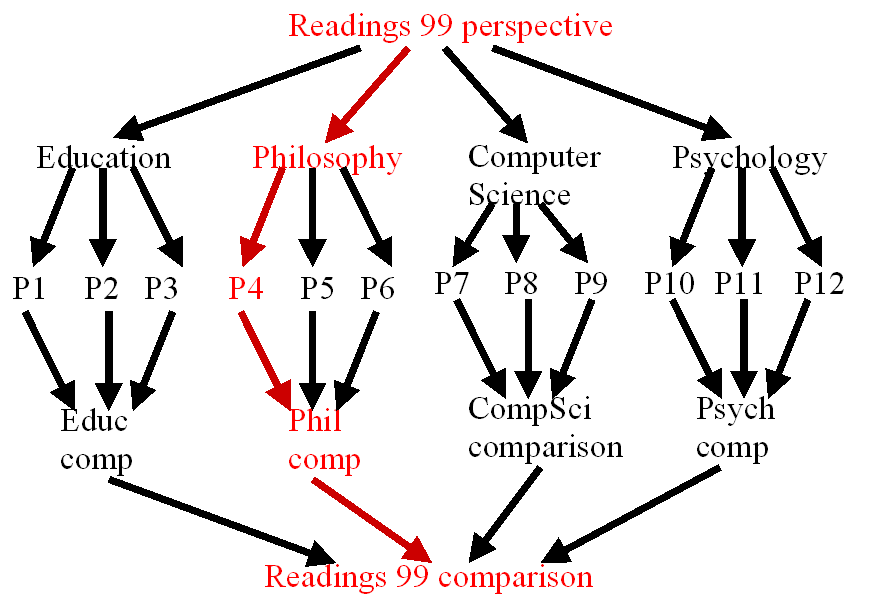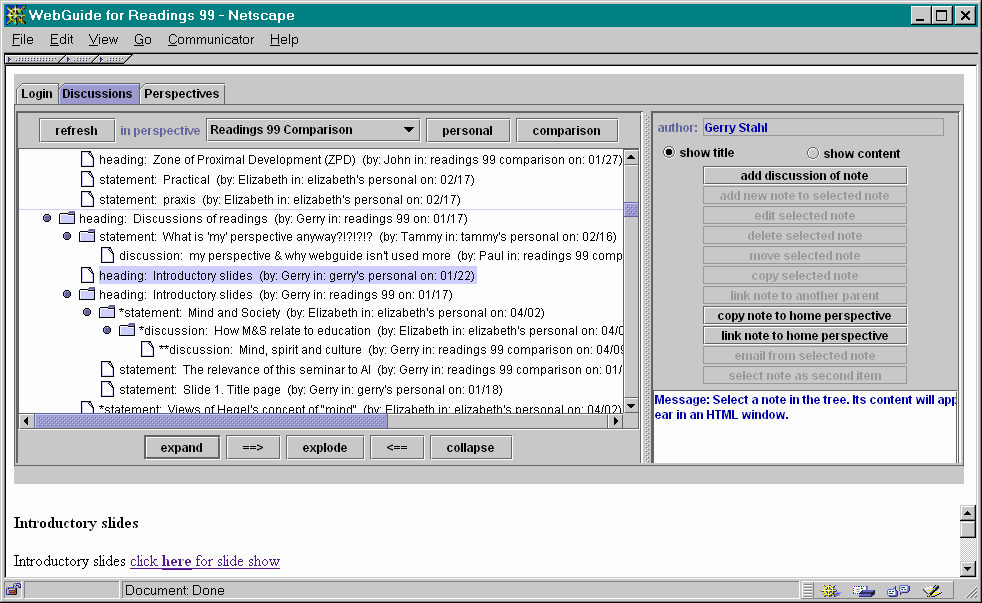CILT '99 Demo – Learning Tools
WebGuide
: Computational Perspectives for Learning CommunitiesGerry Stahl
Center for LifeLong Learning & Design and Institute of Cognitive Science University of Colorado Boulder, CO, USA 80309-0430 Gerry.Stahl@Colorado.eduWebGuide
is an interactive computer-based learning environment initially targeted to middle school problem-based collaborative learning, but currently being used at the graduate seminar level as well. It provides a structured medium within the World Wide Web for students to conduct individual and group research, reflection and knowledge-building.Like CSILE and similar systems, WebGuide is intended to support communication and collaboration within a learning community such as a group of students pursuing research. Although it supports threaded discussions, it is designed more for the collection and organization of related ideas.
The technical innovation consists of a computational perspectives mechanism. This allows a shared information space to be seen from different perspectives. Each community member has their own personal perspective in which they can construct their own system of knowledge – their own "perspective" on the shared research. In addition, collaborators can form team perspectives in which they share ideas and develop team perspectives on the evolving state of understanding. Finally, there are comparison perspectives corresponding to each team and to the community as a whole, in which the ideas from multiple perspectives are brought together for comparison, negotiation and synthesis. The perspectives mechanism provides for the definition of a hierarchy of perspectives in which information is inherited from one perspective to another automatically.
The WebGuide prototype has been used in two classes this semester: a middle school environmental science class and a graduate seminar on "computer mediation of collaborative learning.". This initial experience has raised many important issues for software support of collaboration and has suggested a number of promising responses to these issues. The solutions involve a synthesis of social practices and software affordances.
WebGuide
is being developed by Gerry Stahl and colleagues at the Institute of Cognitive Science and the Center for Lifelong Learning & Design at the University of Colorado at Boulder, in collaboration with NOAA and the Logan School for Creative Learning, with support from NSF and the McDonnell Foundation.![]()
Further information on WebGuide is available at:
http://GerryStahl.net/webguide/
A paper on lessons learned from WebGuide is available at:
http://GerryStahl.net/publications/conferences/1999/aera99/
![]()
The problem of perspectives
. Adult cognition makes extensive, if oft problematic, use of multiple internalized perspectives. The collaborative construction of knowledge also thrives on the formation of perspectives and the interchange among them. This is a difficult and mysterious process that might benefit from computer support. WebGuide is designed to represent and scaffold perspective-taking so that students can perceive the process and subsequently internalize it.
The web of perspectives
. In a seminar on readings in cognitive science, participants from four disciplines developed and shared ideas. Topic headings were entered in a high-level perspective to structure the discussion in the lower perspectives, where they were automatically inherited. Notes entered in personal perspectives are also inherited down the web, where they are collected in comparison perspectives.
A view from many perspectives
. An expandable outline interface in the applet supports browsing among note titles in the class comparison perspective. A selected note is displayed below in the html frame. Because the comparison perspective is not intended for editing, many of the command buttons are grayed out to enforce social practices of perspective-making.